Pavithra Srinivasan in Chennai
He's the director every actor in India wants to work with. He's the man who almost single-handedly revolutionised Tamil cinema and later Hindi cinema, giving it a dimension and presence that fairly dazzled a global audience.
The man who touched subjects and tackled plots other wouldn't touch with a ten-foot pole; the man who recognised talent and mad superstars out of his actors. That's Mani Ratnam for you; quiet, capable, creative and courageous.
Ahead of his bilingual -- Raavan (in Hindi) and Raavanan (in Tamil) -- we take a look at some of his landmark films:
Mouna Raagam (1986)
At a time when romantic sagas were littered with rural themes, melodrama and drippy sentiment, arrived Mouna Ragam (Silent Symphony).
A young girl (Revathy), is married, much against her wishes to a personable young man in Delhi (Mohan). She had a secret love-affair with another (Karthik). Her first forays into matrimony are bitter; the first gift she asks her new husband is a divorce.
It took a Mani Ratnam to move away from cliched romantic dialogues and capture subtle nuances that add so much richness to the story, introduce proper, three dimensional characters that lived breathed and sorrowed like everyone else.
Aided by an understanding cast and Ilaiyaraja's impeccable musical score -- Nilave Vaa, Mandram Vandha Thendral, Pani Vizhum Iravu and Oho Meham Vandhado were outstanding hits -- Mani Ratnam's sensitive handling made the Tamil film an instant classic, and won the Silver Lotus Award for Best Regional Film, that year.Nayagan (1987)
Image: A scene from NayaganWhat can be said about this classic that hasn't been said already?
Even Mani Ratnam's severest detractors had nothing but praise for this remarkable Tamil film that followed the life of a man named Velu Nayakar, supposedly inspired by his real-life counterpart, Varadaraja Mudaliar.
Once again, Ilaiyaraja scored with chartbusters like Nee Oru Kaadhal Sangeetham and Thenpandi Seemaiyile, while Kamal Haasan reached new heights of excellence.
And once again, the film walked away with three National Awards -- Best Actor, Best Cinematography and Best Art Direction. It also made into the Time's list of All-time 100 Best Films.
Agni Nakshathiram (1988)
Image: A scene from Agni NakshathiramTales of siblings are dime a dozen in Tamil cinema but few gave them the importance that this film did; principally because the crux of stories are always romance or intense sentimental drama.
Mani Ratnam's film, on the other hand, portrays a relationship so new and path-breaking that viewers were riveted.
For it is the tale of half brothers; boys who are barely men, sharing a father but born to different mothers. One (Prabhu), reaps all the benefits of a legal marriage while the other (Karthik) frets and fumes under society's backlash and his own perceived wrongs.
It was such a unique look at youth, music and relationships that viewers were pleasantly stunned.
The movie quickly became a sort of marker for urban relationships, not to mention the musical excellence, courtesy Ilaiyaraja's beautiful Rojappoo, Ninnukkori Varnam, and Oru Poongavanam, and P C Shreeram's imaginative cinematography.
Thalapathi (1991)
Image: A scene from ThalapathiFor those who believed that the director's movies were always rooted in the here and now, this film was a surprise: its inspiration was the story of Karna from the Mahabharata.
Thalapathy's Surya (Rajnikanth) was one such man, bound by loyalty and devotion to Devarajan (Mammootty), the Duryodhana of the story.
The man who lives in the sordid world of crime learns about love and his family which resides with his half-brother, the Collector.
This movie was a lot more slick and smooth in terms of production values. The Mani Ratnam template was obvious, and appreciated.
A welcome surprise was the intense performance of superstar Rajnikanth showing another side to the star.
Once again, Ilaiyaraja's Rakkamma, Sundari and Yamunai Aatrilae broke the music charts and Mani Ratnam had another hit on his hands.
Roja (1992)
Image: A scene from RojaThe subject of terrorism required sensitive handling and an intensity not many makers could be sure of creating. Yet again, Mani Ratnam took the reins in his hands.
The tale of a young, naive girl from the rural wilds of Tamil Nadu who gets unexpectedly married to a cryptologist and arrives in terrorist-infested Kashmir immediately struck a chord.
Her travails and tribulations as she loses her husband to a band of kidnappers and runs from pillar to post, securing his release, was riveting to an industry force-fed cornball romances.
Here was a movie that moved from south to north, bridging the divide effortlessly, bringing up love in a way it had never been told before, even as terrorism reared its ugly head.
Roja took the nation by storm; not least because of a young musical sensation called A R Rahman who came up with chartbusters like Pudhu Vellai Mazhai, Kadhal Rojave and Chinna Chinna Aasai.
The film won a slew of awards and international acclaim, and made Mani Ratnam a name to contend with across the nation overnight.
Bombay (1995)
Image: A scene from BombayA young Muslim girl (Manisha Koirala) and a Hindu man (Arvind Swamy) fall in swift, guileless love in a picturesque village in Tamil Nadu.
Their families rise in protest which force the couple to elope to Bombay and begin live anew. Except that it isn't all roses and honey; they've arrived bang in the middle of the communal riots that shook the city in 1992. Only their love for each other and for humanity as a whole will save them.
Many prophesied that the director had bitten off more than he could chew. But they were proven false as his swift screenplay carried them in its wake, aided by A R Rahman's brilliant score, comprising of numbers like Kannalane, Andha Arabic Kadalorum and Uyire.
Once again Bombay won a slew of awards ranging from the Nargis Dutt Award for Best Feature Film on National Integration, to awards on the International Festival Circuits.
Iruvar (1997)
Image: A scene from IruvarOf all Mani Ratnam's films, this one perhaps ranks at the top for the most courageous portrayal of two men who were instrumental in deciding the fate of Tamil Nadu itself, to enormous consequences.
The film is careful to quote that it's not based on real life, tongue-in-cheek fashion but the characterisations, body language and incidents leave you in no doubt of who they are: one an actor who steals people's hearts; the other a canny politician who sets his sights on ascending the political ladder.
Mani Ratnam's extraordinary research and eye for detail made the film a joy to watch.
Mohanlal and Prakashraj gave the performances of their lives as Anandan and Thamizhchelvan, respectively vying with one another to reap the honours.
A R Rahman's music, catching the heights of 40s, 50s, and 60s with numbers like Vennila, Aayirathil Oruvan and Viduthalai delighted listeners. The movie won a National Award for Prakashraj (Supporting Actor), and honours at the Belgrade Film Festival.

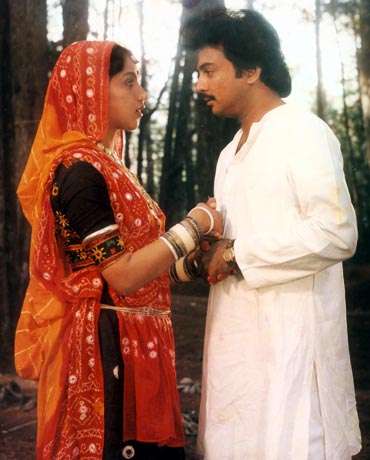
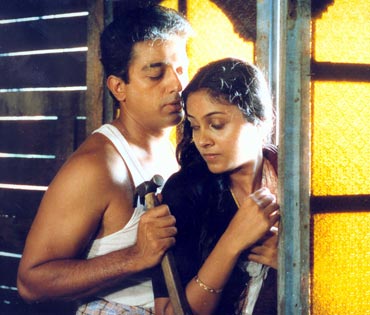

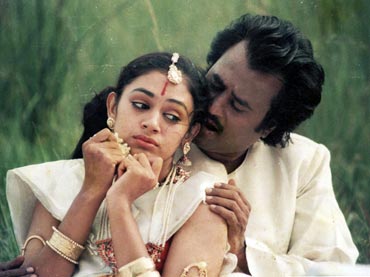
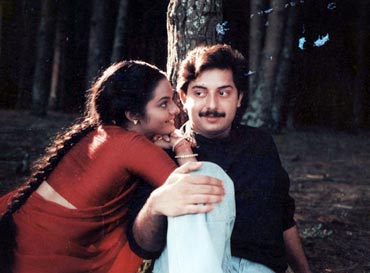
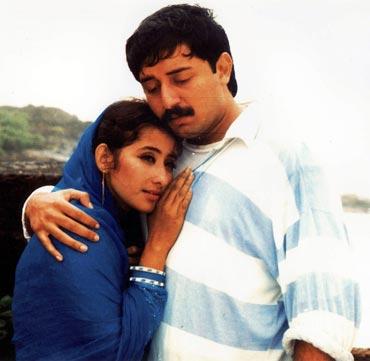
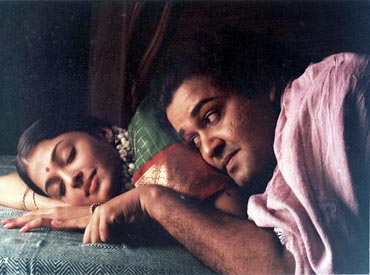
Comment
article